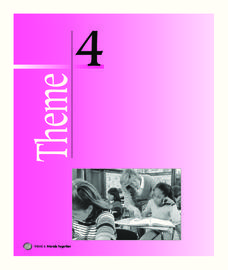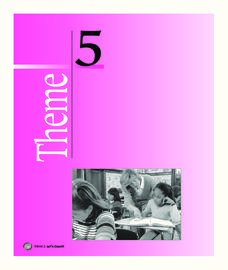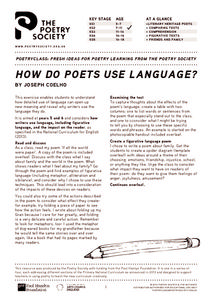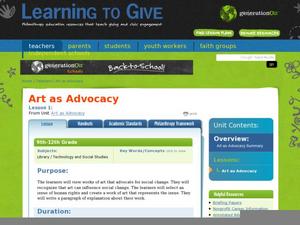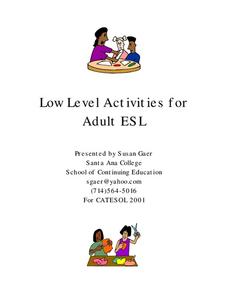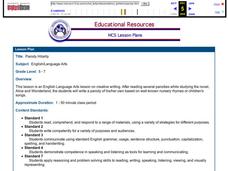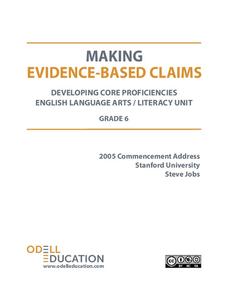Houghton Mifflin Harcourt
Nature Walk: English Language Development Lessons (Theme 2)
Walking in nature is the theme of a unit designed to support English language development lessons. Scholars look, write, speak, and move to explore topics such as camping, woodland animals, instruments,...
American English
Welcome to the Color Vowel Chart
Focus English language learners' attention on word stress and phrase stress with a pronunciation chart that breaks the sounds into moving and non-moving vowel sounds. The chart tool uses colors and key words to indicate...
Houghton Mifflin Harcourt
Friends Together: English Language Development Lessons (Theme 4)
Enjoy this thematic friendship unit compiled with ESL lessons to develop strong language development while listening, speaking, looking, and moving. Class members participate in activities covering topics like making friends, asking for...
Houghton Mifflin Harcourt
Heroes: English Language Development Lessons (Theme 5)
This packet of support materials for the Houghton Mifflin Harcourt thematic units on heroes, contains lessons, exercises, and activities specifically designed for ELD/ESL learners.
Curated OER
Thanksgiving
Introduce the basics of Thanksgiving with a language arts instructional activity. As pupils practice observation skills, vocabulary, and reading comprehension, they design paper turkeys by outlining their hands and feet and by...
Houghton Mifflin Harcourt
Let’s Count!: English Language Development Lessons (Theme 5)
Counting is the theme of this compilation of ESL lessons. Through listening, speaking, and moving, your young learners take part in a variety of activities to enhance their English proficiency such as making menus and books,...
Houghton Mifflin Harcourt
All Together Now: English Language Development Lessons (Theme 1)
All Together Now is the theme of this series of ESL lessons. Provide support to your language learners through games, role play, stories, and discussions all about greeting others, giving commands, telling about themselves, and...
Poetry Society
How do Poets Use Language?
Why do writers choose the language they do? Here's a resource that has the poet himself answer that very question. Joseph Coelho explains why he chose the words and images he used in his poem, "If All the World Were Paper."
EngageNY
Preparing to Write Historical Fiction: Determining Characteristics of the Genre
A language arts instructional activity helps young writers identify elements that make up historical fiction. First, it guides them through elements of fictional pieces with vocabulary cards. Then, pupils work collaboratively to...
Curated OER
Art as Advocacy for Social Change
“Humanscape No.65” by Melesia Casas and Ester Hernandez’s “Sun Maid Raisins” launch a study of how works of art can advocate for social change. After examining these two works and discussing the human rights issues raised, class members...
EngageNY
Summarizing Complex Ideas: Comparing the Original UDHR and the "Plain Language" Version
The eighth lesson plan in this series continues the focus on vocabulary and increasing young readers' awareness of academic language. Pairs of learners participate in a short vocabulary review activity called Interactive Words in which...
ESL Kid Stuff
Past Tense Activities - Regular Verbs
Here is a supplemental lesson plan regarding past tense verbs for English language learners that is a great tool for the classroom when you are teaching grammar exercises.
English Enhanced Scope and Sequence
Differentiate between Formal and Informal Language
The Pledge of Allegiance, the Gettysburg Address, the National Anthem, and the Preamble to the Constitution all get close attention in an exercise that asks learners to rewrite these formally-worded documents into informal language....
Curated OER
Low Level Activities for Adult ESL
Suggestions for interview topics with question prompts, scavenger hunts, oral presentations, and reading and writing prompts abound in this 11-page packet of activities for English language learners. ESL worksheets are also included...
Houghton Mifflin Harcourt
Surprise!: English Language Development Lessons (Theme 2)
Surprise! is the theme of this series of ESL lessons. Cover an array of topics such as where we live, different times of day, shapes, the city and the country, what we do for fun, jobs, and games, all while practicing how...
Houghton Mifflin Harcourt
Down on the Farm: English Language Development Lessons (Theme 8)
Down on the Farm is the theme of this series of ESL lessons designed to support reading, speaking, and listening skills. Over three weeks, your learners will have the opportunity to sing songs, play guessing games, create masks,...
Teachers.net
Figurative Language
When is a staple remover a fanged monster? In your ELA classroom when you're teaching this fun figurative language lesson, of course! Get your young writers using figurative language by making a game of it. Give groups a paper bag full...
PreKinders
Rainforest Word Cards
Great for a science lesson or language arts activity, these picture word cards feature animals and plants that live in rainforest habitats. It includes pictures and names of rainforest residents like lemurs, monkeys, and parrots.
Catholic Charities
Telephone Skills
The challenge in telephone conversations is that speakers and listeners cannot rely on body language to communicate. This 31-page packet includes a curriculum guide, lesson plans, assessments, and resource lists designed to help...
August House
Go to Sleep, Gecko
Use this multidisciplinary lesson to delve into these subjects: English language arts, math, science, drama, and character education. After reading, discussing, and making interpretations about Go To Sleep, Gecko!: A Balinese...
EngageNY
Writing Dialogue: Revising Historical Narrative Drafts to Add Dialogue
Young writers have written, revised, and peer-edited their historical fiction narratives by the 10th lesson plan in a language arts unit. Fourth graders finally combine their revision notes to create a second draft. The double-spaced...
K12 Reader
Major Art Periods
After examining a brief article about the major art periods, readers use the provided graphic organizer to identify the main idea and supporting ideas in the paragraph.
Curated OER
Parody Hilarity
Upper grade and middle school writers study the art of parody. In this language arts lesson, learners study the work of Lewis Carroll, read and discuss parodies from the book, Alice in Wonderland, and construct their own parody based on...
Odell Education
Making Evidence-Based Claims: Grade 6
In order to make evidence-based claims, one must be able to draw explicit information from text. From here, learners take that information, analyze the text to develop a deeper understanding, and connect with the information in order to...
Other popular searches
- English Language Arts Exam
- English Language Arts Games
- Deaf English Language Arts
- English Language Arts Music
- English Language Arts Heroes
- English Language Arts Skills
- Language Arts English
- English Language Arts Grade 3
- English Language Arts Poetry
- English Language Arts Rating=3
- English Language Arts Unit Sc
- Language Arts or English


